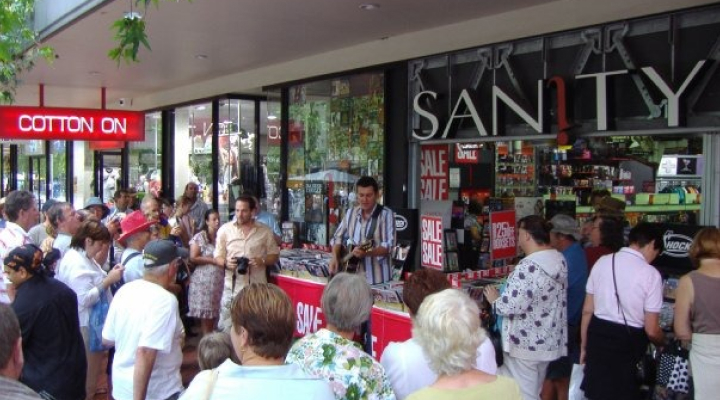What happens between the time that a business announces its closure, and the doors shutting for the final time? As covered by Inside Retail, iconic music retailer Sanity is shutting all 50 of its physical stores by the end of April this year, in line with the lease expiry for each store. Established by Brett Blundy in 1980, the retailer was purchased by Ray Itaoui 13 years ago. Itaoui – who joined Sanity as an area manager in 2001, according to the Australian Financial Review – acknowledged
edged that the business was unable to survive the diminishing availability of physical content, as well as a shift in demand toward digital content among consumers.
Itaoui tells Inside Retail that the stores will not continue to operate as normal until April 30. Rather, it will mark down its product line, in order to clear all stock by the closing date. He said that staff numbers will also be reduced as the brand closes its bricks-and-mortar stores.
Regarding the work that needs to be done between now and then, he said that the brand is clearing all products, making sure that all orders are filled, and communicating with customers on how they can continue to purchase through Sanity’s online platform, sanity.com.au.
“Since we have announced the closure we have seen a spike in sales. Customers are trying to build up their libraries before we close,” Itaoui said.
“We will communicate with as many customers as we can to ensure they understand how they can continue to shop with us.”
Reducing overheads
Communications expert Michael Smith has advised a number of companies who have closed down stores.
While he is not speaking for, or on behalf of, any particular retailer or advisory firm (including Sanity), he said that much of the process depends on whether the business is closing down on its own accord, or if it is going into administration.
He tells Inside Retail that, if the business is shutting down, the owners will have no future interest in customers, but will have to deal with those who are waiting for goods or have vouchers. He believes that modern retail processes make it easier for owners to contact customers via email, social media or SMS.
However, if the business is going into administration, he believes the first priority of the administrators is to save the business. In this case, customers are very important if the business can be saved for the future, and effective communication is critical.
“Administrators will try to trade on a business-as-usual basis while they sort out the company’s affairs. This is because a ‘going concern’ business is easier to sell,” he said.
“But, if there’s no cash in the business, the administrators will have to reduce overheads, which might involve store closures and redundancies. Special sales may be announced to increase cash flow.’
He adds that, in certain instances, a secured creditor will advance some cash if there’s a good chance that the business will sell. Meanwhile, the administrators will typically start a marketing campaign to sell the business, or seek an investor to inject capital.
“In [five to six] weeks, the administrator must report to creditors and make a recommendation to either liquidate the company (if there is no buyer), return the company to the directors [or] accept a Deed of Company Arrangement,” he said.
“The deadline may be extended with court approval if a deal is possible in the near future.”
Customers, creditors and employees
Smith says that – during the period when a sale process is under way – customers are critical stakeholders because they are important to the business, and any future owners.
“It is important to keep them posted even though the fate of the business may be unknown for many weeks,” he said.
“Sometimes a retailer’s customer base is its most important asset, so they need to be looked after.”
However, when it comes to the crunch, he said that customers rank behind secured creditors and employees if there is a liquidation.
Meanwhile, Itaoui said that Sanity’s priority is to ensure that each of its team members know exactly what the closure means for their career and employment future.
“Despite the challenging and ever evolving entertainment landscape, the Sanity business has prospered and remained successful for many years, quite an achievement in the fast-changing retail space,” he said.
“[It has gone] on to become one of Australia’s most respected and recognisable retailers.”

